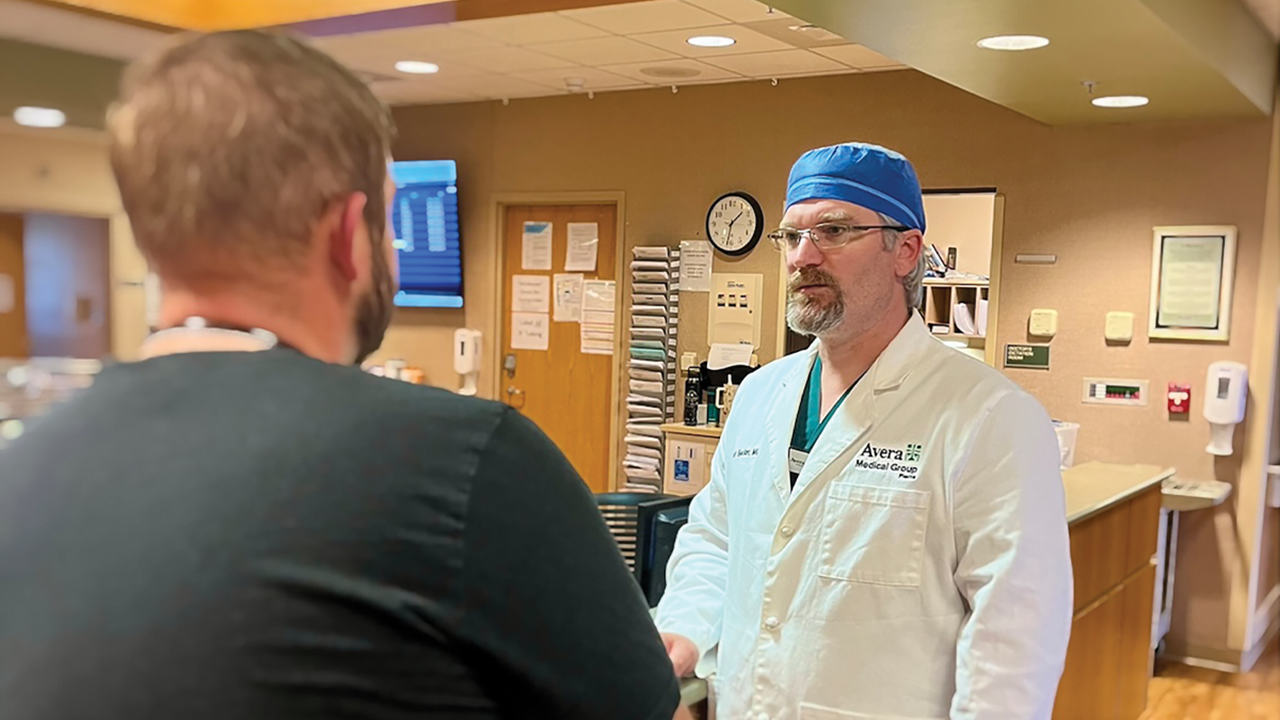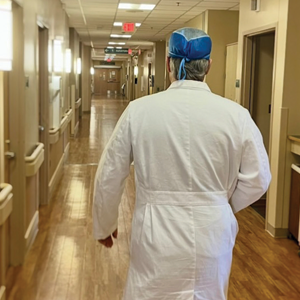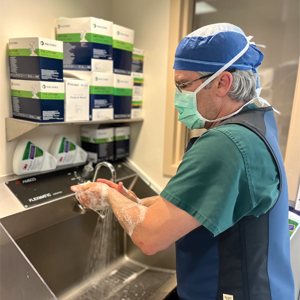Surgical Knots and Family Ties

Monitors beep softly down the hall, call lights flash above patient doors and a young Brandt Becker trails behind his father on morning rounds. Some might say he had no idea he’d one day walk these same halls as a surgeon himself, but if you asked Dr. Becker, he’d say he always knew. Growing up in Pierre, it was never a question for him where he’d attend medical school.
“I don’t even think I interviewed at any other place. It was just like, why would I go to any place else?” For him, USD was a no-brainer. He always knew he’d return to his rural hometown, and that someday, the patients he’d seen as a child would become his own.
Dr. Becker isn’t just a doctor in his community; he’s a product of it. While some physicians are drawn to the broader resources of urban centers, Dr. Becker chose to stay close to home, providing care to the very people who shaped him. Today, Dr. Becker practices general surgery in Pierre, South Dakota – his hometown, the community that raised him, and the place where his father, Dr. Eldon Becker, still practices. Father and son now share an OR schedule. Some days, they scrub in together. Most days, they pass each other between cases, working side by side in the same hospital where he once followed a few steps behind.
In Pierre at Avera St Mary’s Hospital, it’s not uncommon to find family ties woven into every corner of the care team: physician couples, cousins who both work as doctors, sisters-in-law serving as advanced practice providers and parent-child duos like the Beckers. Dr. Becker’s wife once worked alongside him as a nurse when his team was short-staffed. That kind of closeness reflects something unique about rural medicine. Relationships run deep, shaped by years of familiarity, and the kind of trust and connection that only comes from truly knowing one another.
Rural general surgery demands a unique kind of versatility. In one day, Dr. Becker may see anything from a small breast abscess or a routine colonoscopy to a thyroid cancer or ischemic bowel. Dr. Becker’s patients are often his neighbors, former classmates or the children of people he grew up with – familiar faces with unique needs.
“We see a wide range of ages and from all different socioeconomic backgrounds,” he says. But the work doesn’t stop at the operating table. As a rural surgeon, Becker has to navigate not only his surgical practice, but also the complexities of health care access, questions like: How do we get this patient the antibiotics they need when they can’t afford them? How do we make sure they have a way to get to their follow-up appointment or safely home after surgery?
These are the realities of caring for a community where access to care, transportation and financial concerns often play a role in when and how patients seek help. Some haven’t seen a doctor in years, not by choice, but because of the barriers in their way. By the time they arrive, they may be facing more advanced conditions. Many of these are issues that might have been caught earlier with more consistent access to care.
As a physician in a regional hospital, Dr. Becker often finds himself balancing the resources of a smaller facility with the expectations of a larger one. “It’s hard to be medium-sized,” he shares. “Our biggest challenge is that we have to function within that means, up to our capacity, without exceeding that and compromising patient care, patient safety, patient outcomes. It can be a delicate line.”
Teams do everything they possibly can before turning to larger tertiary centers for backup. Dr. Becker reflects on this when handling tough cases: “Let’s deal with what we have now, because we can handle that, not the what ifs." When he hits that limit, he knows he still has resources: telehealth, air transport and a network of trustworthy specialists he can call on.
These challenges, both medical and bureaucratic, add pressure to an already demanding job. But for Dr. Becker, this is the essence of rural surgery: resourcefulness, relationships and the commitment to delivering care no matter the obstacle. As Dr. Becker reflects on his career, his thoughts often turn to the future of rural health care. Embracing technological advances in care is part of that growth: “The only thing that doesn’t change is that everything changes, right?”
For Dr. Becker, adopting new technology isn’t just about efficiency, it’s about strengthening his relationship with his patients. Tools like AI-assisted documentation, though sometimes met with skepticism, have allowed him to spend more time face-to-face with patients and less time focused on note-taking. With ambient listening software capturing the details of his visit, he no longer has to type in the room or worry about recalling a symptom days later, freeing him to be fully engaged in the conversation with his patients.
“I hope that it improves patient outcomes, improves patient safety and that it can allow us to continue to focus on that patient physician interaction, and focus on what matters,” he says.
Looking ahead, Dr. Becker is just as focused on shaping the next generation of physicians. His mission is clear: to help develop well-rounded doctors who understand the importance of building trust with their patients and their teams.
“I think what is really important is making sure that there’s balance in your education,” he shares. That means encouraging students to embrace both technical skills and emotional intelligence. He is dedicated to helping the next generation of physicians develop the same integrity, drive and accountability that define his own practice.
In the steady hum of the hospital, with monitors beeping and doors softly opening and closing, Dr. Becker’s journey is a quiet echo of those early mornings spent shadowing his father. The same halls, now filled with his own patients, are a testament to the continuity of care and the trust built over generations.
Though much has changed since those childhood rounds, some things remain constant – his commitment to his patients, his belief in the strength of relationships, and his focus on fostering a well-rounded, compassionate team of health care providers.
As he continues to embrace new technologies and face the challenges of rural surgery, Dr. Becker remains steadfast in honoring the legacy of care he grew up with, while building a future where trust and community still come first.





